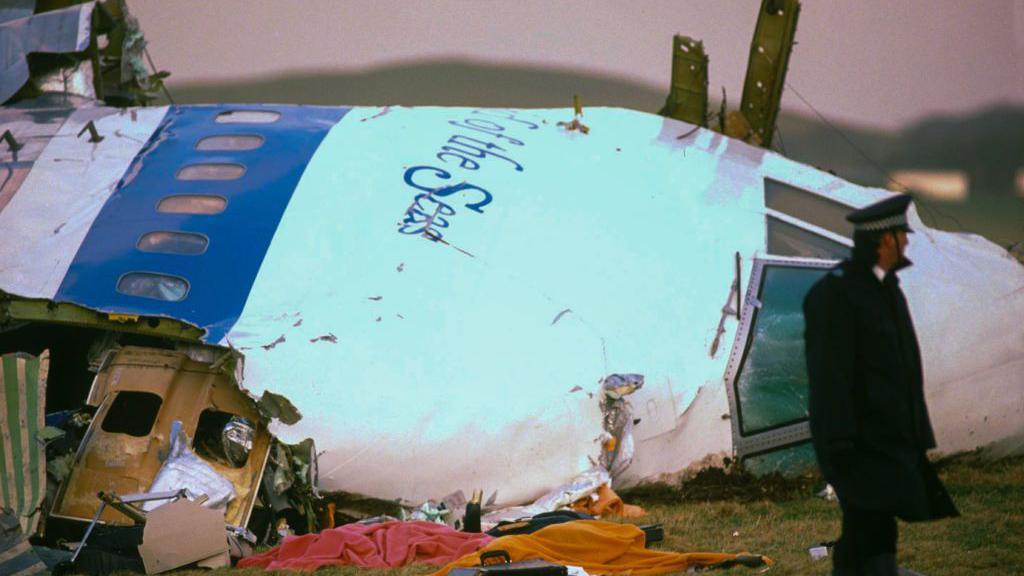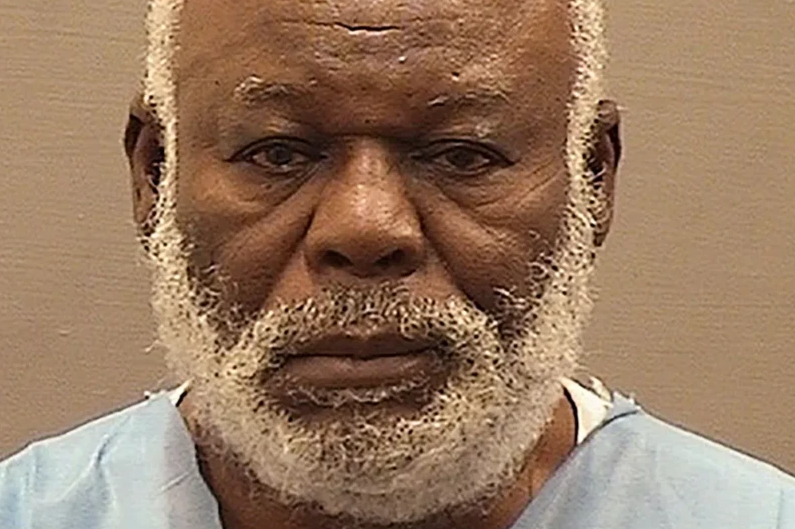FBI identifies 400 people affected by Lockerbie bombing ahead of US trial

A total of 270 people died after Pan Am 103 was brought down over Lockerbie in 1988
- Published
An international search by the FBI has identified more than 400 people from 10 countries who lost relatives in the Lockerbie bombing in 1988 or suffered emotional injury in its aftermath.
The US law enforcement agency tried to track down people directly affected by the atrocity in advance of a Libyan suspect's trial next year.
A federal court in Washington DC is deciding how to allow remote access to the case against alleged bombmaker Abu Agila Masud.
The 417 people who responded to the FBI survey included more than 100 people from Scotland, 32 of them from Lockerbie itself.
FBI search for 'all Lockerbie victims' ahead of suspect's US trial
- Published13 September 2024
Lockerbie relatives urged to sign up to view trial online
- Published15 July 2024
A total of 244 respondents came from the US and 164 from the UK.
Others came from the Netherlands, Spain, the Czech Republic, Ireland, Canada, Mozambique, Australia and Jamaica.
Pan Am 103 was brought down as it flew from Heathrow to New York four days before Christmas 36 years ago.
The airliner broke apart after a bomb exploded in its hold at 31,000ft, killing all 259 passengers and crew on board.
Another 11 people died in Lockerbie when wreckage from the plane destroyed their homes.

Alleged bombmaker Abu Agila Masud is due to stand trial in Washington DC next May
In 2001, after a nine-month trial, a Scottish court sitting in the Netherlands ruled that the bombing was the work of Libya's intelligence service.
Abdelbasset al-Megrahi was convicted of playing a key role in the plot and jailed for life, only to be freed on compassionate grounds in 2009 after falling terminally ill with cancer. He died in Libya three years later.
Abu Agila Masud was taken into US custody in 2022 and is due to stand trial in Washington DC next May, accused of making the bomb which destroyed the plane.
In advance of the trial, a group representing American relatives of the victims asked for remote access to the proceedings, saying that many of them were too old and infirm to travel to Washington DC for the case.
US lawmakers subsequently passed legislation to allow the relatives to get remote access "regardless of their location".
To help the trial judge decide how that should be done, the FBI set out to identify and question two groups of people affected by the bombing.
The first included those who were “present at or near the scene in Lockerbie when the bombing occurred or immediately thereafter” and who suffered “direct or proximate harm (e.g. physical or emotional injury) as a result."
Lockerbie bombing suspect pleads not guilty
- Published8 February 2023
An atrocity that caused heartbreak around the world
- Published13 December 2022
Many of the Scots who responded to the survey identified themselves as members of that group, including military personnel and rescue workers who took part in the operation to recover the bodies of the victims.
The second group involved “the spouse, legal guardian, parent, child, brother, sister, next of kin or other relative of someone who was killed on Pan Am 103 or killed or harmed on the ground in Scotland or someone who possesses a relationship of a similar significance to someone who was killed or harmed in the attack".
Most of the respondents told the FBI they would like video access via a weblink or app, allowing them to follow the trial from home. A slightly smaller number would also be content with audio-only access.
'Palpable trauma'
Masud's defence has suggested that people could watch the case at courthouses and embassies, but the US government argued that option was "logistically unreasonable, unfeasible, impractical and unworkable."
Instead, it is arguing that a "Zoom for Government" platform should be used, with access strictly controlled.
Participants would be told that recording or rebroadcasting the trial would be illegal. The software would include technology to identify anyone breaking the rules.
In a submission to the court, lawyers from the US Attorney's Office said: "These families have suffered for more than three decades.
"This attack was the largest terror attack on the US before September 11, 2001... it remains the single most deadly terror attack in UK history.
"The law passed by Congress applies only to this case.
"Given the death and destruction left by this bombing, and the palpable trauma and pain of the multiple victims spread globally throughout the world, one can only hope that another law like this one will never be needed again."